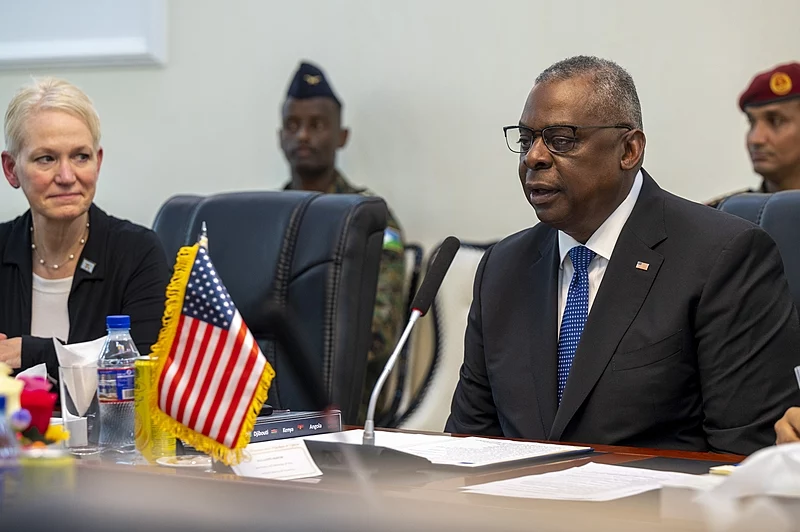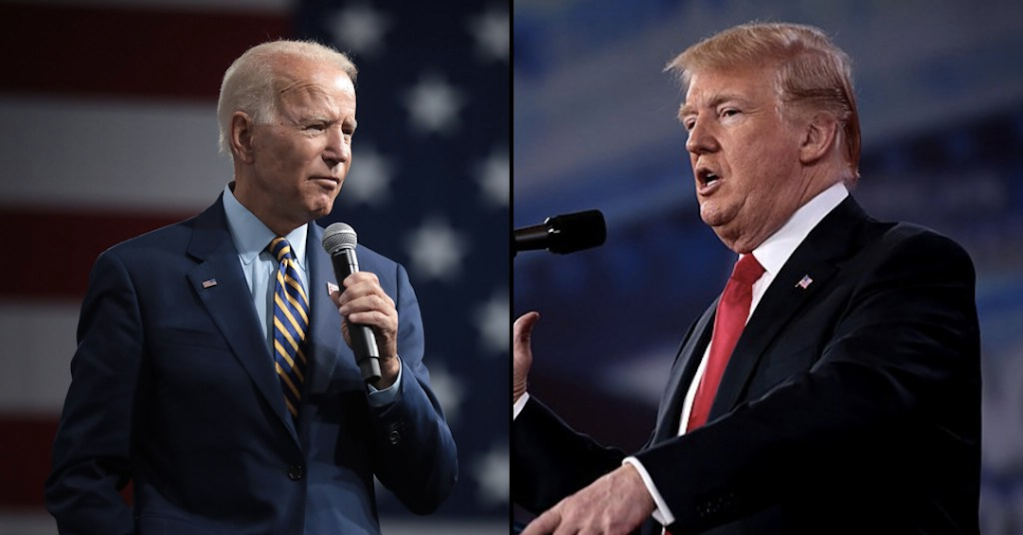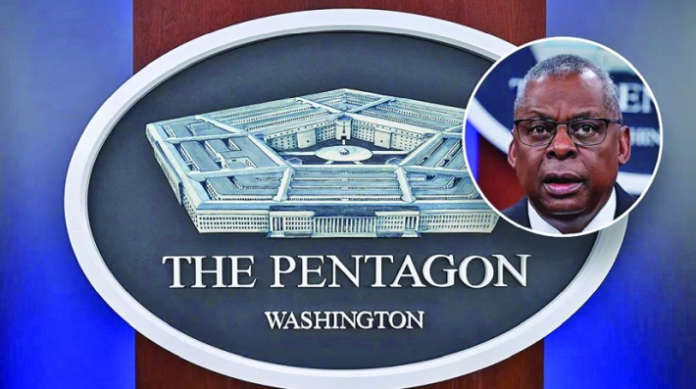What Secretary Austin's brief disappearance says about the four-star general's leadership style
Three days before Christmas, septuagenarian four-star general and Secretary of Defense Lloyd Austin disappeared from the Pentagon without President Biden and his advisers knowing. He had gone to a military hospital to receive treatment for an unspecified illness without informing the president he served. Admiral John Kirby, the spokesman for the National Security Council, told the press that the president had no intention of firing him: “Of course, as expected, we will examine the process and procedures here and try to learn from this experience learn". He didn't say what there was to learn.
Kirby added that Biden continues to have full confidence in Austin and “looks forward to having him back at the Pentagon as soon as possible.” . . . There are no plans or anything other than Secretary Austin remaining in office.”
Austin's medical timeline compiled by the Associated Press began Dec. 22, when the minister underwent surgery for prostate cancer under general anesthesia at Walter Reed Army Hospital. He did not inform President Biden or anyone else in the White House about the operation, but temporarily delegated some of his authority to Deputy Defense Secretary Kathleen Hicks. She was not informed of the reasons. Austin was released from the hospital the next day and worked from home until New Year's Day when he was taken to the hospital in an ambulance in severe pain and admitted to the intensive care unit. He did not inform anyone on his staff or in the White House about the crisis.
On January 2, on the advice of his Army doctors, he called a junior aide to the hospital and reassigned some of his operational responsibilities to Hicks, who was then on leave in Puerto Rico. She was not informed of his renewed hospitalization.
That day, Austin informed four members of his staff, including two senior generals as well as his civilian chief of staff and his civilian public information director, of his continued hospitalization. None of them passed this information on to the White House. It is unknown whether they were instructed by Austin not to do so. Air Force Gen. Charles Brown, the newly appointed chairman of the Joint Chiefs of Staff, was informed of Austin's ongoing illness, but he too remained silent. The Pentagon press corps learned nothing.
On Thursday, January 4, US fighter-bombers flew a mission pre-approved by Austin and bombed a military target in Baghdad. Hicks eventually learned that Austin was in the hospital, and she and an aide briefed Congress and Jake Sullivan, the national security adviser, who in turn briefed Biden. The next day, the Pentagon told the press and public that Austin was at Walter Reed. Austin apologized on January 6, saying he could have better informed the media and public. The president had not previously learned that his defense secretary had been treated for prostate cancer at Walter Reed two weeks earlier and had returned to the intensive care unit on New Year's Day. Two days later, Biden learned that his defense secretary had also been treated for cancer.
All of this happened at a time when there was a war going on, or two, maybe even three.
Austin's behavior was particularly puzzling because after graduating from West Point in 1975, he excelled in the Army in every way possible. He went through Airborne and Ranger training and was selected to attend all the good schools, including the Army War College, Auburn and Webster University. He served in Iraq and Afghanistan and held leadership positions in some of the Army's top combat units, including the 10th Mountain Division, the 82nd Airborne Division and the 3rd Infantry Division, which he led to Baghdad. Infantry Division, which he led to Baghdad. In 2009, he was named director of the Joint Chiefs of Staff at the Pentagon, a high-ranking position that inevitably led to four stars and even more important positions. President Barack Obama later appointed him deputy chief of staff of the US Army. From 2013 to 2016 he commanded the important CENTCOM. After retiring in 2016, he served on various boards, including at Raytheon, Nucor and Tenet Healthcare, before being appointed Secretary of Defense by Biden. He was confirmed almost unanimously by the Senate.
An experienced retired officer who held high positions in the Pentagon for decades and worked closely with members of the Joint Chiefs of Staff told me that the office of defense secretary, which was held under the Kennedy and Johnson administrations by Robert S. McNamara and under George W. Bush by Donald Rumsfeld was dressed, became more glamorous and important. “The Foreign Minister’s schedule,” he says, “is so full that he can’t even drink coffee alone. He has an appointment calendar that is prepared a week in advance. On many mornings, the former secretaries “received a briefing from Defense Intelligence and then went to the Joint Chiefs of Staff to receive their briefing.” The Chairman of the Joint Chiefs of Staff has no operational role in military leadership, but is the president's top adviser on military matters. The leadership of America's military forces and wars is in Austin's hands. “He’s the enforcer,” one officer told me.
Austin shunned the glamor and often flattering attention of the Pentagon press corps. That just wasn't for him. The best indication of the secretary's behavior in recent weeks came from two reporters who, in an otherwise laudatory Dec. 18 New York Times article, reported how "President Biden's quiet man at the Pentagon" made his second visit to Israel "and in the “Spotlight” on Israel’s increasingly controversial war against Hamas. The cable said Austin had "held a low profile" during his time in office and that it had been "more than a year" since he briefed the Pentagon press corps. Austin “sometimes avoids reporters who travel overseas with him. On such trips, he prefers to dine alone in his hotel room unless he has an appointment with a foreign counterpart.” A successful four-star general at the head of a massive war machine and a committed loner? More than interesting.
The retired Pentagon officer, who has close ties to the Pentagon, told me that the problem with Austin “was not that he was absent without permission, but that no one at the Pentagon or the White House asked about him or missed him. Nobody asked where he was. Nobody raised the alarm that the foreign minister had disappeared. Nobody cares where he goes. How can you disappear for a week when you have something to do? The Secretary of Defense is the most important member of the Cabinet - the one the President and the nation rely on to address national security. “You don’t have to rely on the foreign minister in this regard,” said the retired officer.
The US is currently engaged in two hot wars by providing weapons, funding and advice to Ukraine and Israel. They are engaged in what appears to be a long-term cold war with Russia and China: these rivalries have been an important pillar of the Biden administration's foreign policy. In my opinion, this is a losing policy that Biden and the Democrats will pay dearly for in the next election. Another important election will take place in Taiwan on Saturday, the outcome of which will have a significant impact on US policy towards China. Additionally, the United States is embroiled in a war that could escalate into a hot war in the Red Sea. Since October, U.S. Navy ships and commercial cargo ships have been attacked with missiles and PT boats manned by the Yemeni Houthis, who are backed by Iran and have said they will continue to attack international commercial shipping in order to support Hamas and the to support the besieged civilian population in Gaza.
The Defense Department's lack of leadership was immediately apparent when the USS Laboon, a destroyer patrolling the Red Sea to protect international trade to the Far East through the Suez Canal, was threatened by a Houthi missile-carrying drone late last week. The ship's captain had permission to act in self-defense and the ship's gun batteries destroyed the drone, but the captain wanted to do more. He repeatedly asked for permission to go to the source of the drone attack on land in Yemen and destroy the drone. His request to defend his ship - an escalation that would have required high-level approval from the missing Austin, who was hospitalized at the time - was ignored. “There was no one to ask,” the retired officer told me.
Of course, it was a decision that could have enormous implications given the war between Israel and Hamas in the Middle East, and Austin, had he been on duty, would have had to consult the White House and ultimately the president and his national security advisers .
President Biden, who has not yet publicly commented on the affair surrounding his missing defense secretary, was at the time on vacation with his family on the island of St. Croix in the Virgin Islands, where he was welcomed by wealthy Democratic Party donors. Presidents need a vacation, so do generals, and perhaps it would be time for Biden to take the secretary to lunch to find out what he would do to end the wars in which America and its allies are embroiled.
You never know what's going on in the quiet. The mysterious, withdrawn secretary could have a lot to say. It was a big mistake to hide his health problems and he is suffering for it in the media, as he should. But Austin's constant promotions and combat experience show that he shows up on the battlefield when he's needed.
My advice here - I was once press secretary to a senator running for president - is for Austin to call a press conference and carefully explain what he did and why. But don't expect him to reveal more than the bare-bones details of his medical issues. Nothing more is to be expected.
As readers of this column know, I have a lot of problems with Biden and his foreign policy force, but I like that the president, an old acquaintance, said Austin will keep his job.
Until now.




